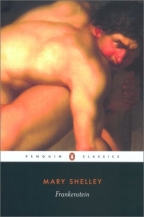Frankenstein
Penguin Classics /Penguin Putnam
US Trade paperback
ISBN 0-141-43947-5
Original Publication Date: 01-01-1818
Publication Date of this Edition: 05-06-2003
320 Pages; $8.00
Date Reviewed: 09-07-03
Reviewed by: Katie Dean © 2003
|

|
|
REFERENCES
|
COLUMNS
|
|
General
Fiction, Science
Fiction, Horror
|
07-31-03,
08-22-03,
02-13-04
|
'Frankenstein' (Mary Shelley) has entered fictional history as a
book about a man-made monster. However, this is a gross
understatement for a book that contains as its central themes ideas
about idealism and passion, selfishness and cruelty, good and evil.
Under any circumstance this would make for a compelling novel, but it
is one that has gained new relevance amidst the contemporary debate
about genetically created animals and genetically modified foods.
When it was first published in 1818, 'Frankenstein' must have
appeared to be just another horror story, chilling, but ultimately
inconceivable in reality. At a time when people believed God to be
the author of creation, any serious suggestion that man could create
life must have been considered blasphemous. In essence,
'Frankenstein' is the story of a young scientific genius, Victor
Frankenstein, whose studies lead him to discover the means of
creating life. Compelled by his passion, and thinking of nothing
beyond scientific achievement and the consequent academic glory,
Frankenstein uses this knowledge to create a quasi-human being. This
one action changes the lives of Frankenstein and those around him in
ways that he never imagined and he appears powerless to do anything
to prevent the terrible consequences of his actions.
Today, two hundred years on, scientists are actually capable of
creating a life and, like Victor Frankenstein, nobody really knows
how this will affect the world. The modern reader must almost
inevitably see 'Frankenstein' in the light of modern science. In this
light, Shelley's novel reads like a treatise against genetic science
containing a dire warning of the consequences of 'playing God'.
However, Shelley's literary priorities may lie in a different
direction. 'Frankenstein' also explores the duality of human nature
and the way in which people are perceived by society. Shelley
suggests that the treatment they receive as a result of social
perceptions will ultimately draw out or suppress certain elements of
their nature.
Frankenstein is surrounded by loving friends and family who draw
out his own kind nature, but when faced with his hideous creation, he
becomes selfish and unsympathetic. The monster is portrayed as an
indescribably grotesque and evil creature, but surprisingly seems
also to possess a generous and loving nature that his treatment at
the hands of humans has forced him to suppress. The monster is
shunned purely on the basis of his appearance, only being given the
opportunity to display his kind nature by a man who is blind. It is
the bitterness he feels at this treatment that brings out his desire
for revenge against the human race. Mary Shelley herself came from a
well-known and rather unconventional family. Her parents were the
radical feminist thinker, Mary Wollstonecraft and the philosopher,
William Godwin. She had an affair with the poet Percy Bysshe Shelley,
eloping with him in 1814 and later marrying him in 1816 after the
death of his first wife. It is conceivable that 'Frankenstein'
actually expresses Shelley's own frustration with her society's
readiness to judge character based on appearance and to frown upon
certain behaviour without very good reason.
'Frankenstein' is written in the first person, thus drawing in the
reader's sympathy. The idealism and disappointment of Victor
Frankenstein comes across very clearly. We are even made to feel
sorry for the monster, despite his crimes. Shelley allows her
audience to empathise with her characters, making her novel
compelling as well as stimulating. It is easy to see why
'Frankenstein' has survived the test of time and remains a popular
work of fiction today.
